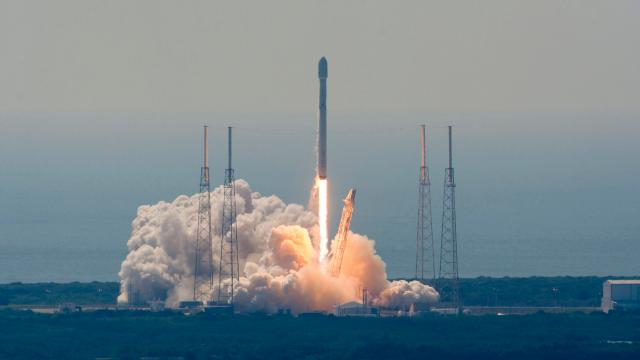If you woke up today wishing to fling yourself into a black hole, you may be wondering what’s in store for NASA under President-elect Donald Trump. It is difficult to say much with certainty. But overall, the space agency will probably be directed to focus more on deep space activities and crewed spaceflight over the next four years, while its top-notch Earth science programs could suffer serious cuts.
Image: SpaceX/Flickr
Trump has been practically radio-silent on the cosmic beyond until recent months, when he started issuing some vacant, nice-sounding platitudes about how space is great and America’s for the taking. (Although, in a September policy statement, he did note that space is not the “sole property” of America.) Overall, Trump’s rhetoric on space tends to echo his rhetoric on governance in general, which is to say, he casts himself as a saviour who will transform NASA from a bureaucratic boondoggle into a revived symbol of American leadership and ingenuity. “Under a Trump administration, Florida and America will lead the way into the stars,” Trump said at a recent rally at the Orlando Sanford International Airport.
Practically speaking, what does the tangerine elect hope to accomplish in space? A few weeks back, the Trump campaign brought on former congressmen Robert Walker to flesh out some talking points. Perhaps the most significant space policy shift Walker discussed at an October 26 meeting of the FAA’s Commercial Space Transportation Advisory Committee was that Trump’s administration would refocus NASA’s budget on “deep space achievements”, while scaling back Earth science research.
“The idea that NASA should get out of the Earth observation business is definitely worth noting,” said John Logsdon, a professor at George Washington University’s Space Policy Institute. As a top priority for the Obama administration, NASA’s Earth Science Division has fared quite well in recent years, its budget increasing steadily from $US1.5 billion ($1.9 billion) in 2009 to $US1.9 billion ($2.4 billion) this year.
It is unclear what would happen to this program, which includes a fleet of state-of-the-art satellites collecting round-the-clock data on our planet’s vital signs, if the Trump administration along with a cooperative House and Senate decided to slash its budget. Walker hinted that some of NASA’s Earth-observing missions might be moved over to NOAA, but as Logsdon notes, the scientific research capabilities of NASA and NOAA are not always interchangeable.
Walker also highlighted the Trump campaign’s commitment to “human exploration of the solar system by the end of the century”, and to transferring more low Earth orbit operations over to commercial companies like SpaceX and Orbital ATK. The latter essentially represents a continuation of policies started by George W. Bush and continued under the Obama administration, namely the Commercial Crew and Commercial Cargo programs. Eventually, this policy agenda envisions transforming the International Space Station into a public-private partnership.
The one other noteworthy tidbit Walker proposed was a reinstitution of the National Space Council, to be headed by the vice president. Originally established in 1958 to coordinate civil and military space activities, the space council was abolished by President Nixon in 1973, before being resuscitated by President George H.W. Bush for several years in wake of the space shuttle Challenger disaster. At this point, it is not clear what a revived National Space Council would do, other than install Mike Pence as a key player in future American space policy.
Which brings the biggest takeaway as far as Trump and space go: So far, his off-Earth policy agenda is heavy on starry-eyed rhetoric and light on critical details. Will NASA’s overall budget change in the coming years? What’s to become of the SLS rocket, or the space agency’s envisioned Journey to Mars? Will those in favour of sticking a person on the Moon again finally win ground over proponents of NASA’s Asteroid Redirect Mission? These are questions that are going to take time to answer.
“Depending on one — I happen to know very hurriedly written — 800 word essay as the statement of Trump’s space policy is dangerous,” Logsdon said. “We’ve still got a whole transition to go through.”
[SpaceNews, SpacePolicyOnline, Chemical and Engineering News]
